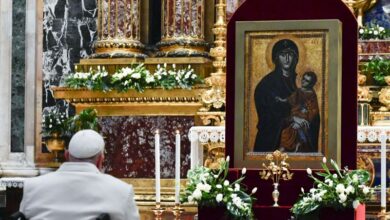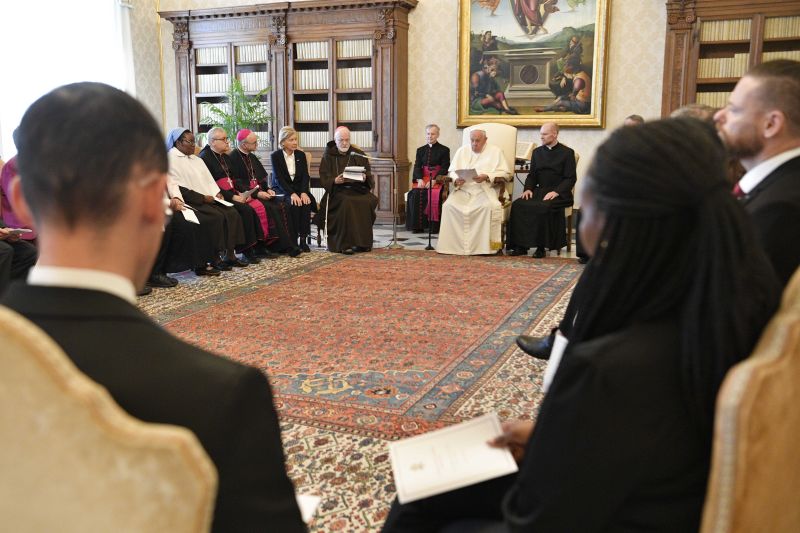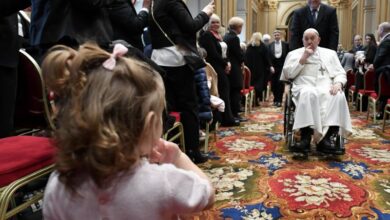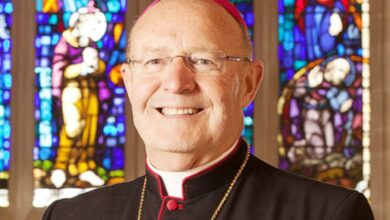‘He’s coming!’: Joyous Eucharistic pilgrimage visits New York, crosses Brooklyn Bridge

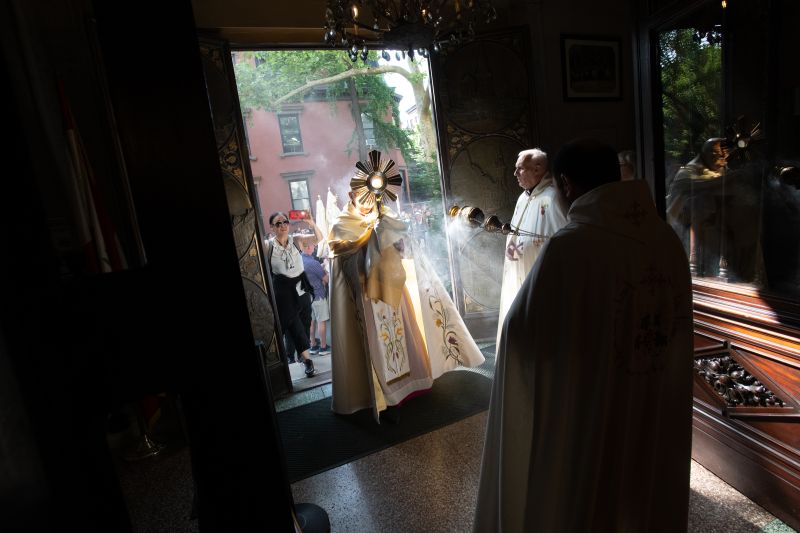 Bishop Robert J. Brennan of Brooklyn holds the Eucharist as he enters Our Lady of Lebanon Maronite Cathedral in Brooklyn, New York, on May 26, 2024. The visit was part of the New York leg of the National Eucharistic Pilgrimage. / Credit: Jeffrey Bruno/CNA
Bishop Robert J. Brennan of Brooklyn holds the Eucharist as he enters Our Lady of Lebanon Maronite Cathedral in Brooklyn, New York, on May 26, 2024. The visit was part of the New York leg of the National Eucharistic Pilgrimage. / Credit: Jeffrey Bruno/CNA New York City, N.Y., May 27, 2024 / 17:11 pm (CNA).
The eastern route of the National Eucharistic Pilgrimage marked one of its most anticipated early highlights Sunday in New York City, with stops at St. Patrick’s Cathedral and the former home of St. Elizabeth Ann Seton before a scenic crossing of the Brooklyn Bridge.
On a breezy, sun-splashed day, the joyous, multilingual procession turned heads as it made its way through throngs of Memorial Day Weekend tourists — including sailors in their bright white uniforms taking in the sights during the city’s Fleet Week celebration.
Later in the day, pilgrims waiting outside the St. Elizabeth Ann Bayley Seton Shrine on State Street reacted like star-struck celebrity spotters when they first caught sight of the procession approaching the Catholic landmark at the southern tip of Manhattan.
“He’s coming! He’s coming!” several people shouted. “He’s here!”
When the monstrance finally arrived in front of the shrine, a group of pilgrims outside knelt on the sidewalk, some in tears.
Sunday’s procession signaled the start of the second full week of the National Eucharistic Pilgrimage, an ambitious, first-of-its-kind event spanning two months that culminates in mid-July at the National Eucharistic Congress in Indianapolis. The undertaking, aimed at reviving devotion to the Eucharist among U.S. Catholics, began on Pentecost Sunday, May 19, with pilgrims setting out from launch locations in Connecticut, Minnesota, Texas, and California.
After passing by Yankee Stadium and traveling through Central Park earlier in the weekend, the pilgrimage resumed Sunday with matins and lauds at the Church of St. Vincent Ferrer on the Upper East Side and from there to St. Patrick’s for Trinity Sunday Mass with Cardinal Timothy Dolan.
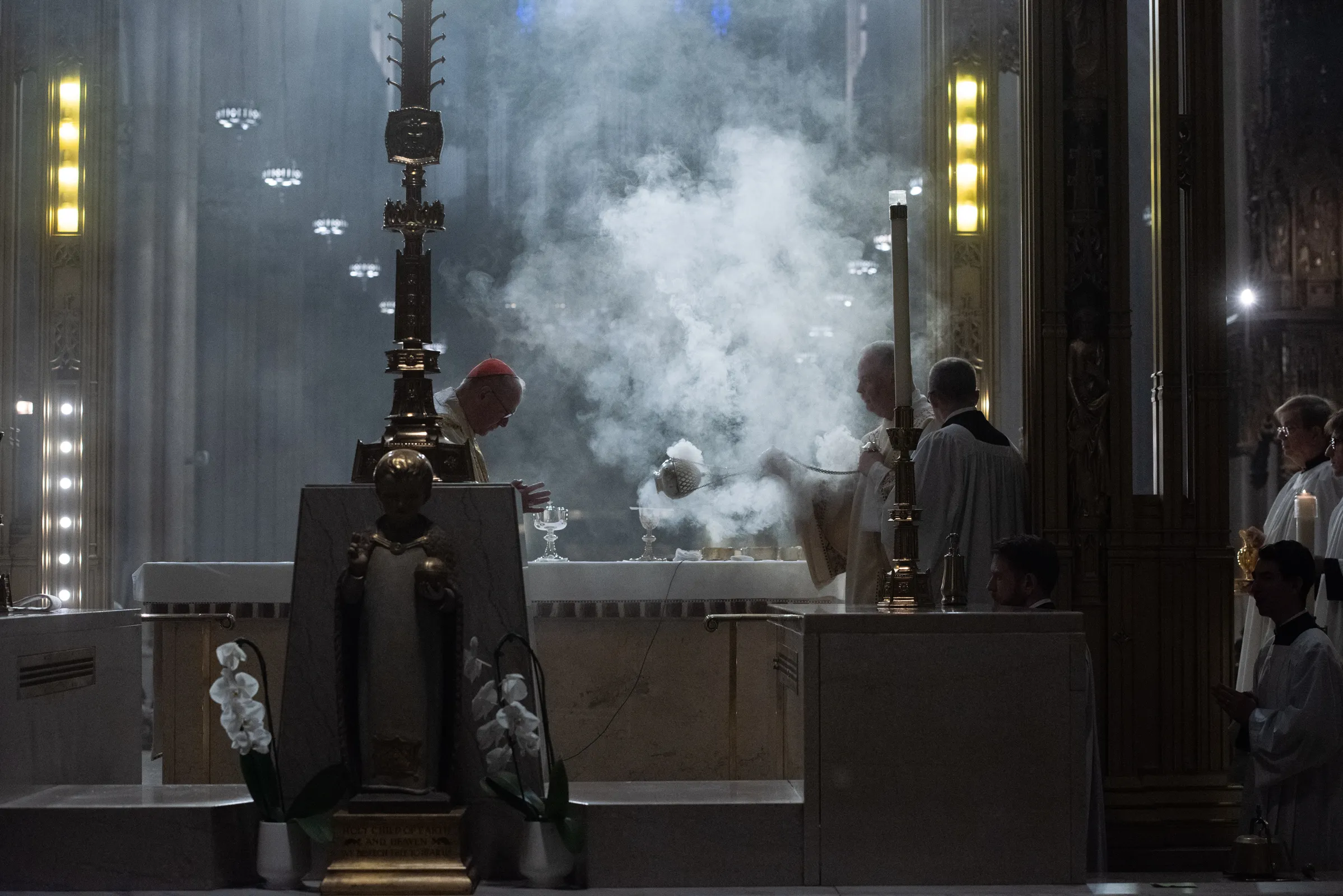
In his homily, Dolan spoke about the Eucharist as a gift that invites believers to deepen their participation in the life of the Holy Trinity.
“Every time we worthily receive our Lord in holy Communion we put another log on the fire of God’s life within us,” the cardinal said.
“Every time we might feel somewhat listless or weak, sinful, worried, or desperate, we fan into a flame the wavering flicker of God’s life within [us] by receiving the second person of the Most Blessed Trinity, God the Son, Our Lord and Savior, in the most holy Eucharist,” he continued.
“And … when we ask for an increase of sanctifying grace, our prayers are especially effective … when offered before the real presence of Our Lord in the Most Blessed Sacrament,” Dolan noted.
After Mass, the Eucharist was processed in a monstrance outside the cathedral to the front steps on Fifth Avenue, where Dolan knelt in prayer and then gave a benediction.
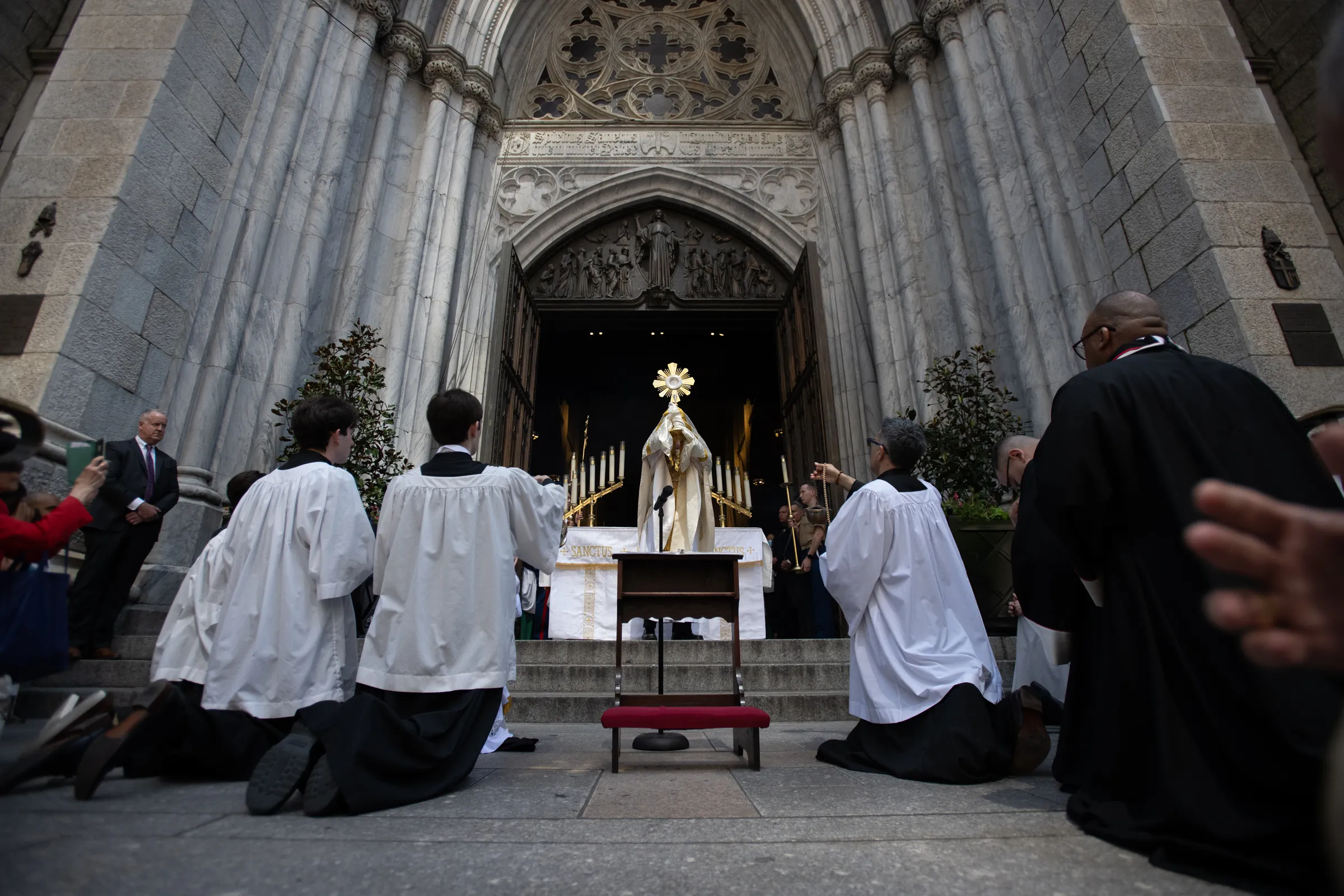
A day of ‘great joy’
With Bishop Gerardo Colacicco, an auxiliary bishop of the Archdiocese of New York, holding the monstrance aloft, the procession headed south from St. Patrick’s for another two hours to St. Peter’s Church on Barclay Street.
There, pilgrims rested in the pews while Father Roger Landry, a regular contributor to EWTN News, gave a short talk on St. Elizabeth Ann Seton, who converted to Catholicism there in 1805, and Venerable Pierre Toussaint, another heroic parishioner who lived in the early 1800s.
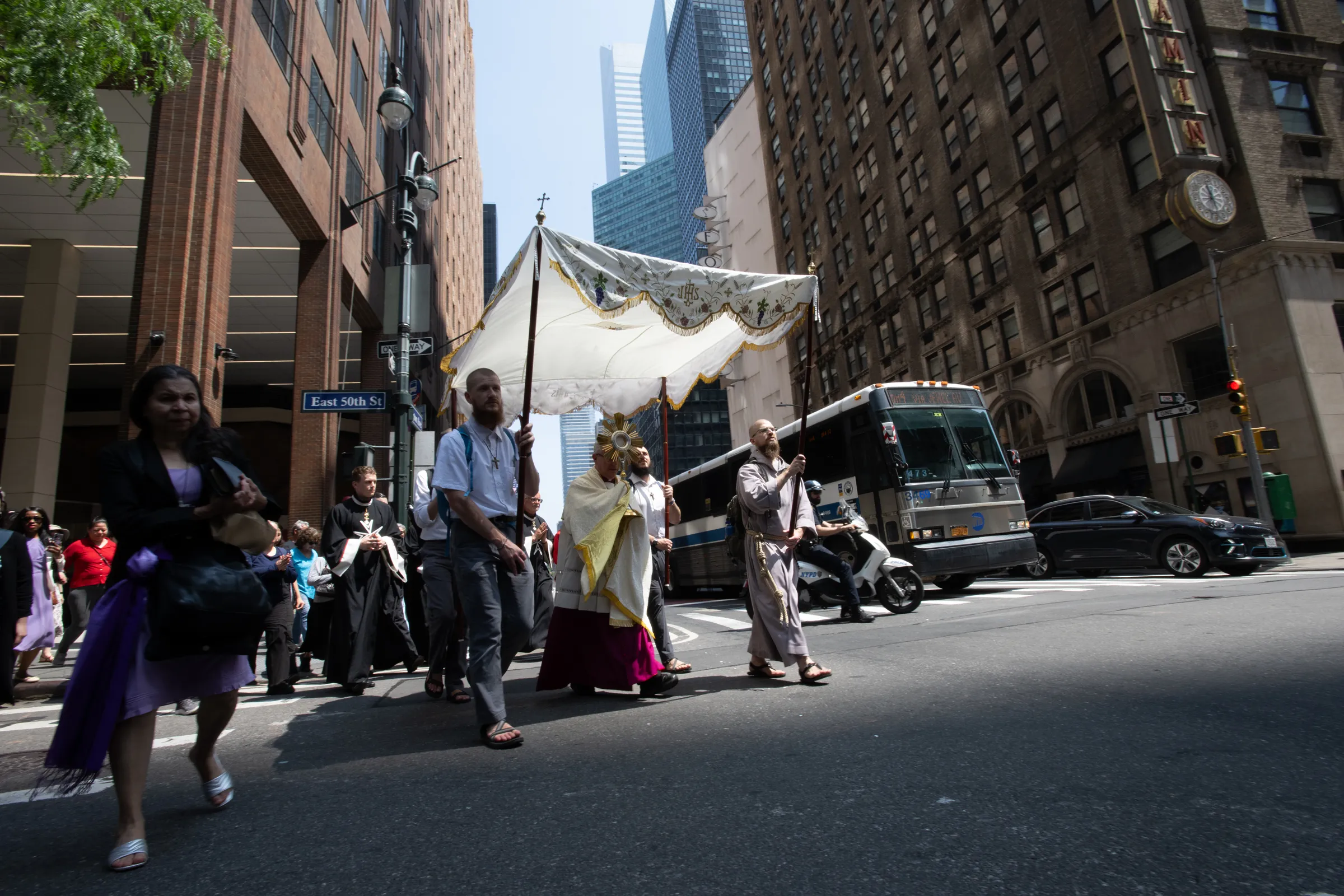
In addition to being a designated Eucharistic preacher as part of the nationwide revival campaign, Landry is one of 23 “perpetual pilgrims” who have committed to completing the entirety of their respective pilgrimage route.
“It was a great emotion when we arrived at St. Peter’s Church,” said Sister Cecilia of the Franciscan Missionary Sisters of the Infant Jesus, a nun from Bologna, Italy, now based in New Jersey.
“I have done many pilgrimages, and there is always this great joy when you arrive at one of these places. Every pilgrimage place is different. It gives hope in your spiritual life,” Sister Cecilia told CNA.
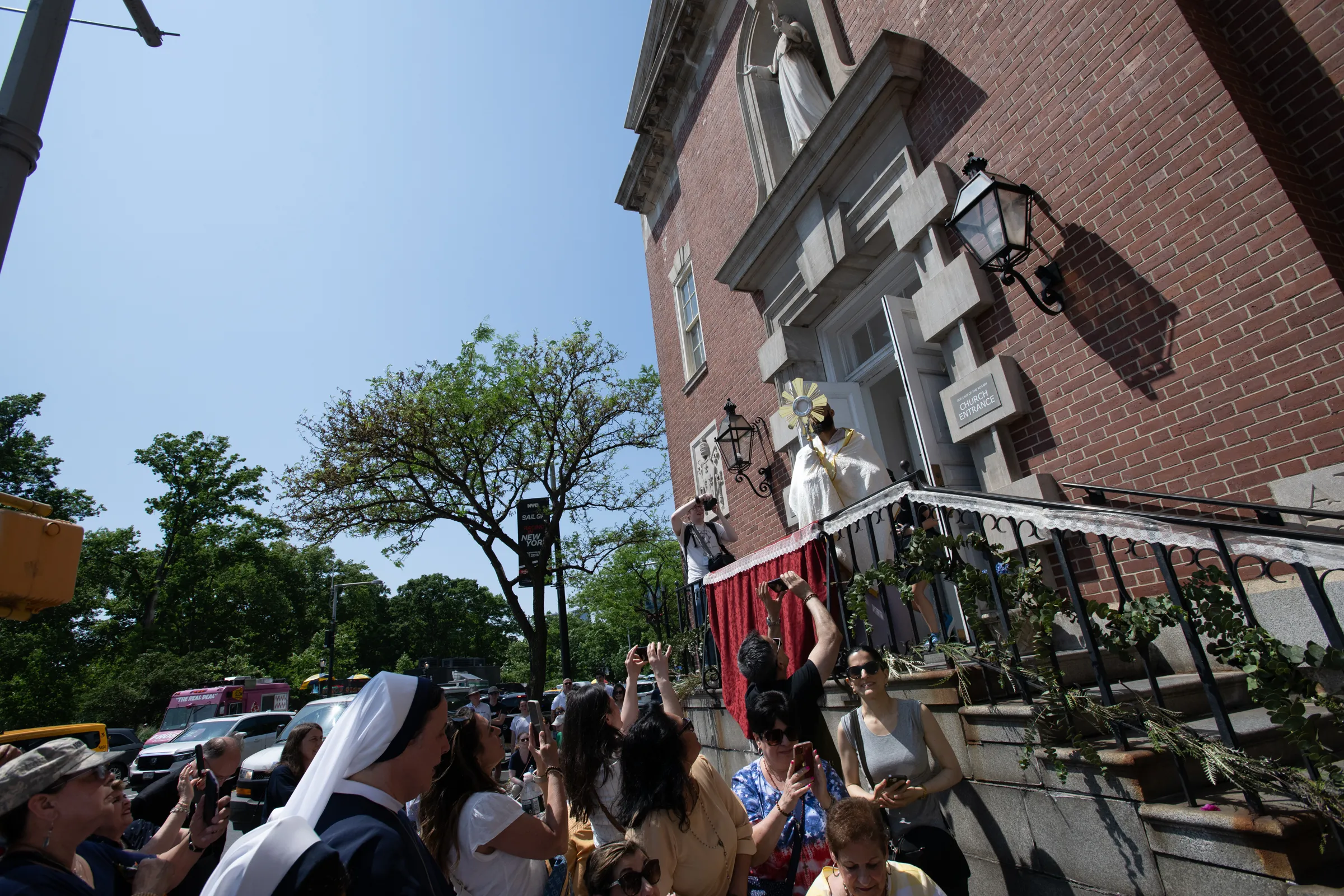
The next stop was the Shrine of St. Elizabeth Ann Bayley Seton, where the future American saint — for whom the eastern pilgrimage route is named — lived from 1801 to 1803, after the bankruptcy of her husband William’s business. Sister of Life Gianna Maria spoke inside the packed shrine about about the saint as a model of perseverance in suffering and trust in divine providence.
On to Brooklyn
From there, the procession made its way to the Brooklyn Bridge. A crowd of about a thousand people moved through the streets of the Financial District singing behind the monstrance: nuns and priests from different orders, young people, the elderly, and mothers and fathers pushing baby strollers. A large percentage of the crowd was Hispanic, with groups singing in both English and Spanish.
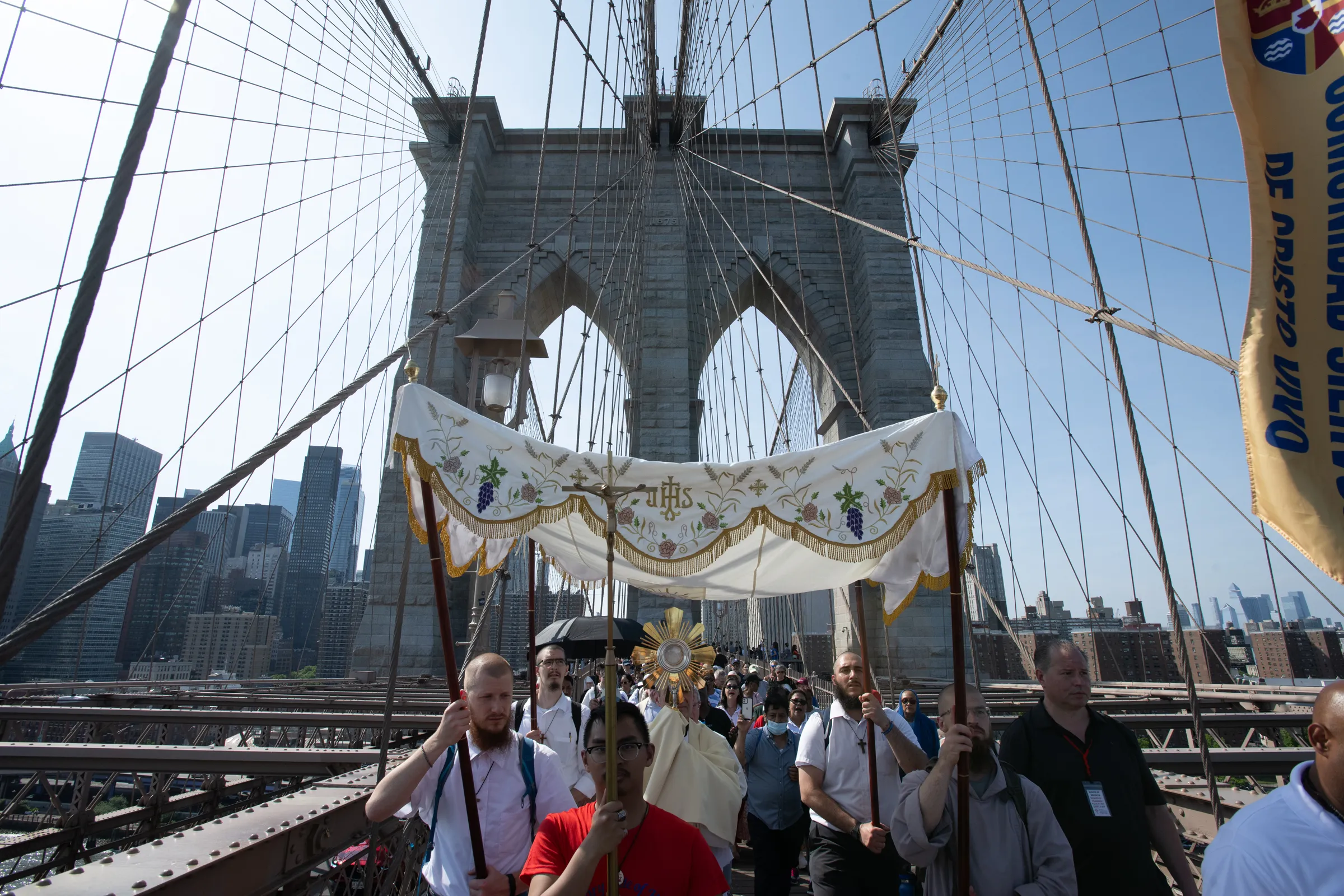
As the pilgrims crossed the iconic bridge, U.S. Navy ships could be seen in nearby New York Harbor.
At the midpoint of the span, the procession paused for a benediction, after which Colacicco handed the monstrance to Bishop Robert Brennan of Brooklyn. In Brooklyn, the procession stopped briefly at Our Lady of Lebanon Maronite Cathedral.
“We came with over 300 pilgrims from Long Island with Bishop John Barres [of the Diocese of Rockville Centre, New York]. Most of our pilgrims traveled on public transportation to get there. This was a community of our local Church joining with our universal Church,” said Father Matthew Browne, director of the office of evangelization and catechesis for the Rockville Centre Diocese.
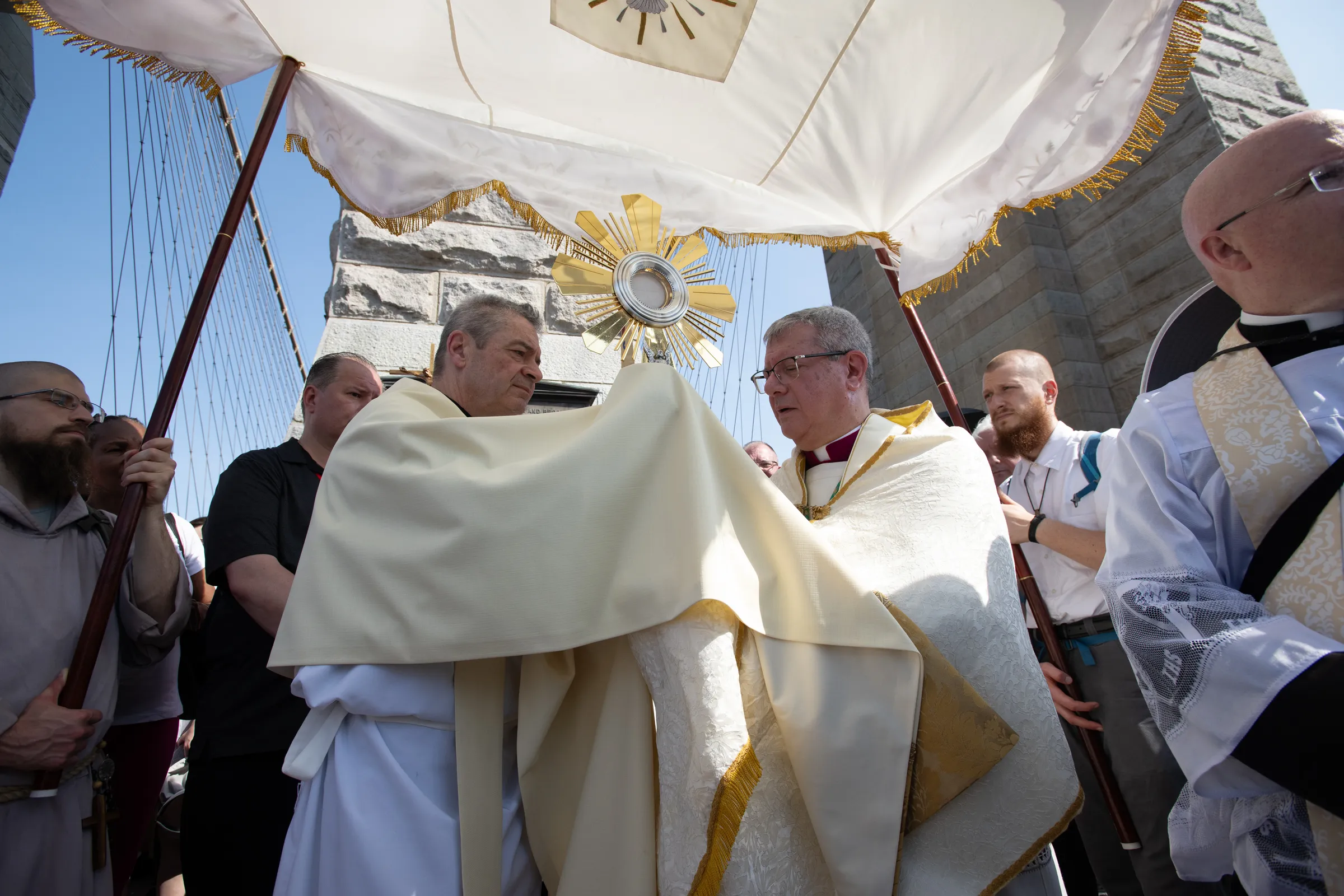
“Our world does not understand the nature of true love. When we bring Christ in the Eucharist to the streets, we are bringing true love into the world that desires true love, even though they cannot name it,” Browne said.
Robert Bruder, another participant from Long Island, said he came back to the Catholic faith last year.
“It was very encouraging to see so many people witnessing to the truth of our faith, people of different backgrounds and cultures,” he said of his experience Sunday.
“The world needs Christ and a strong Catholic Church to bear witness to the truth. Eucharist processions will encourage those who have lapsed in the faith to come back,” he said.
For Sister Cecilia, the Eucharistic procession across the Brooklyn Bridge was inspiring.
“People were very welcoming. Priests, nuns, families, the young, bishops, walking together is always a moment that generates closeness and the helping of each other — even if you don’t know each other,” she observed.
“I helped a woman push a baby stroller. Another person gave me a bottle of water. Becoming a pilgrim means being a Church on the outside. Normally, we are inside in adoration and our many activities as nuns,” she said.
“But today we were on the outside. We were with Jesus in the Eucharist. People became interested. They asked prayers from me. Some nuns gave out prayer cards. Others made the sign of the cross. This makes our group become bigger,” she said.
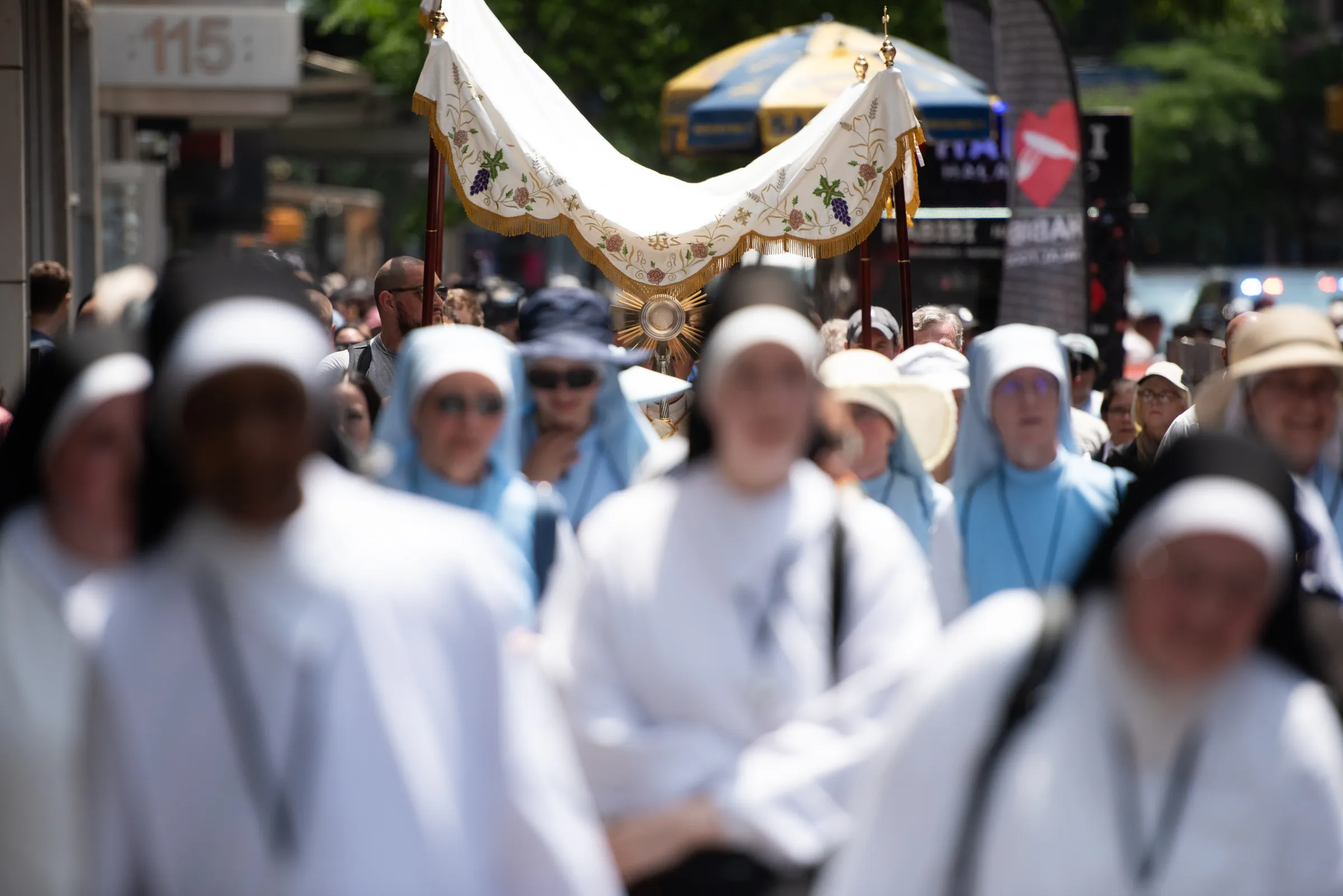
“New York City is a city which is far from spirituality, but today we were a part of something extraordinary,” said another pilgrim, city resident Maria Baldi.
“We had the opportunity to encounter Jesus among the people, among the tourists — not hiding inside a church or within a small group. We became witnesses with Jesus,” she said.
She noted how the procession that crossed the Brooklyn Bridge had to stay on one side of the bridge, while tourists crossed in the opposite direction.
“They saw people in prayer, and they saw the Blessed Sacrament. This generates curiosity and questions,” she said. “It makes you think. It made people stop and look.”
On Monday, Memorial Day, a small delegation including a handful of perpetual pilgrims was scheduled to travel with the Eucharist by boat for a blessing at the Statue of Liberty before continuing to Perth Amboy in New Jersey.


